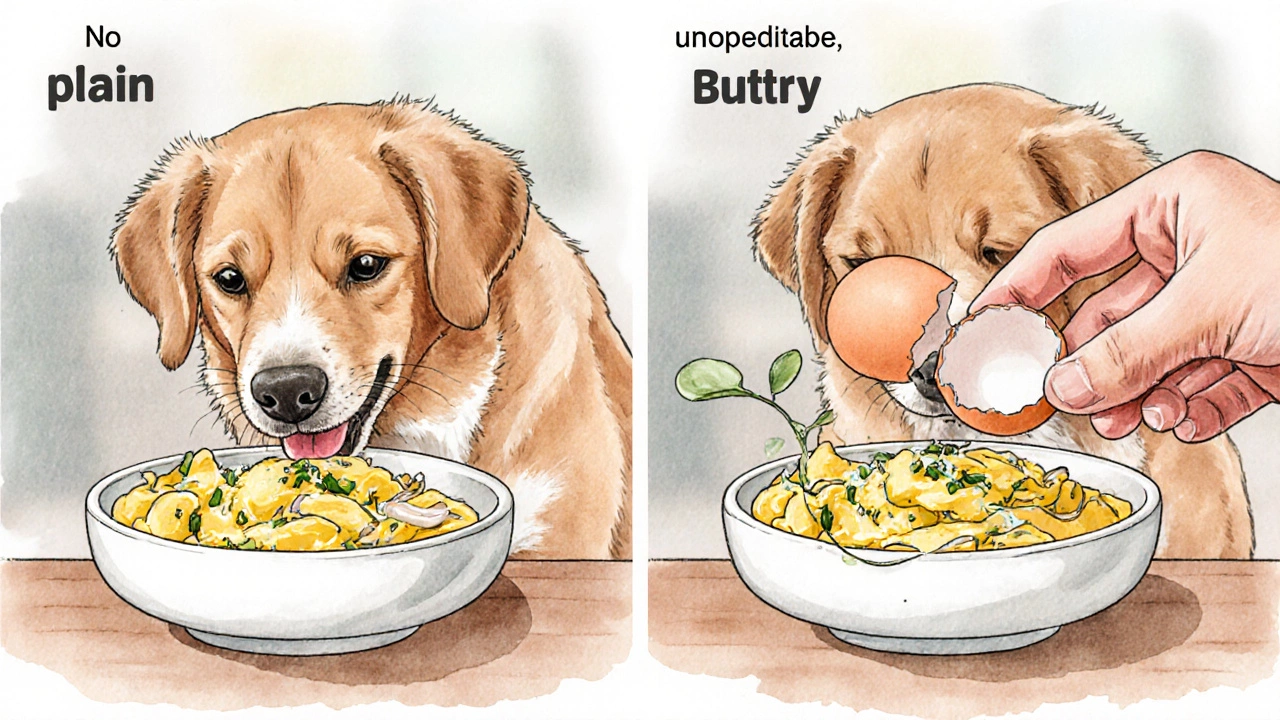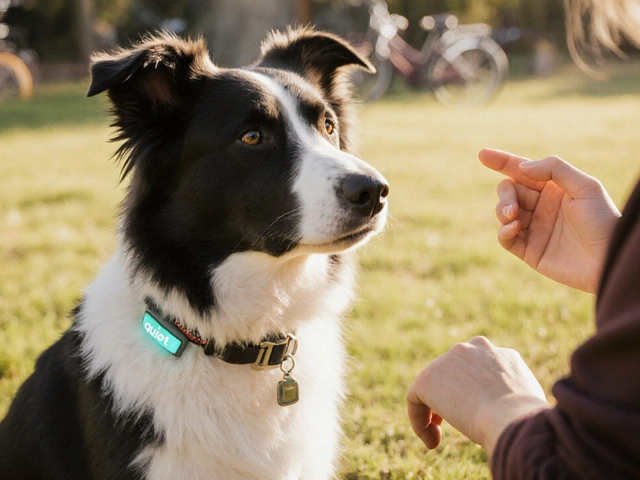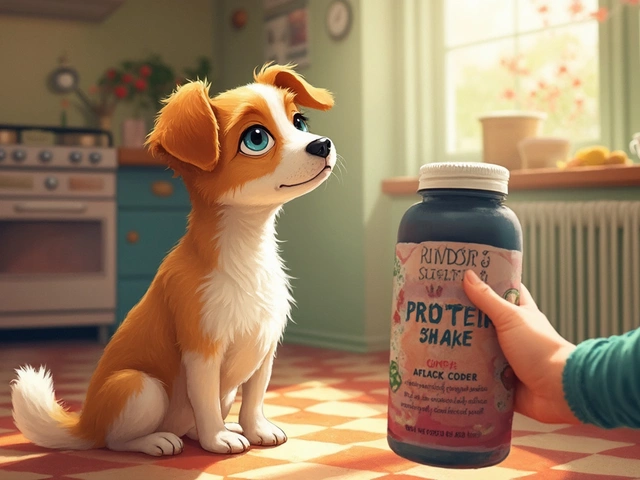Dog Egg Portion Calculator
Calculate Safe Egg Portions
Safe Egg Portion
RecommendedEach egg = 70 calories
Why This Matters
Eggs are nutritious protein sources, but overfeeding can cause weight gain and digestive issues. For a 30lb dog, one egg is about 10% of daily calories. Always feed eggs as a treat, not a meal replacement.
Ever cracked open a couple of eggs for breakfast and caught your dog staring with those big, hopeful eyes? You’re not alone. Scrambled eggs are a quick, comforting meal for humans-and many pet owners wonder if they can share a bite. The short answer is yes, dogs can eat scrambled eggs. But there’s more to it than just tossing a spoonful into their bowl.
Why Scrambled Eggs Are Generally Safe for Dogs
Eggs are packed with high-quality protein, essential amino acids, and healthy fats. A single large egg has about 6 grams of protein and 5 grams of fat, plus vitamins like A, D, and B12, along with selenium and riboflavin. These nutrients support your dog’s muscle repair, skin health, and coat shine. When cooked plainly, scrambled eggs are easy to digest and gentle on sensitive stomachs.Many vets actually recommend eggs as a protein boost for dogs recovering from illness or needing extra calories. A 2023 study from the University of Edinburgh’s Veterinary Nutrition Lab found that dogs fed a diet including cooked eggs showed improved coat condition within four weeks, with no digestive issues reported in over 90% of cases.
How to Prepare Scrambled Eggs the Right Way
Not all scrambled eggs are created equal. What’s safe for you might not be safe for your dog.- Use plain eggs only. No butter, oil, milk, cheese, or cream. These add unnecessary fat and can trigger pancreatitis in dogs.
- Avoid salt, pepper, garlic, or onions. Even small amounts of salt can raise blood pressure in dogs. Garlic and onions are toxic-they damage red blood cells and can lead to anemia.
- Cook thoroughly. Raw eggs carry a small risk of salmonella or E. coli, and raw egg whites contain avidin, a protein that can interfere with biotin absorption over time. Always cook eggs until the whites and yolks are firm.
- Use a non-stick pan. If you must use oil, go for a tiny drizzle of olive oil-no more than a teaspoon for a medium-sized dog. Better yet, just scramble them dry.
For a small dog (under 20 lbs), half an egg is plenty. For a medium to large dog (30-80 lbs), one whole egg is fine. Bigger breeds (over 80 lbs) can handle one and a half eggs, but don’t make this a daily habit.
How Often Can You Feed Scrambled Eggs to Your Dog?
Eggs are a treat, not a meal replacement. Think of them like a snack, not a staple.Most dogs can safely have scrambled eggs 2-3 times a week. If your dog is overweight, has a history of pancreatitis, or is on a special diet, check with your vet first. Dogs with kidney disease may need to limit protein intake, so eggs might not be suitable.
One common mistake: owners start feeding eggs daily because their dog loves them. That’s a recipe for weight gain. One egg is about 70 calories. For a 30-pound dog, that’s nearly 10% of their daily caloric needs. Too many eggs can throw off their nutrient balance and lead to obesity or digestive upset.
What About Eggshells?
Some people crush eggshells and sprinkle them on food for extra calcium. It’s not necessary if your dog eats commercial dog food, which is already balanced. But if you’re feeding a homemade diet, eggshells can help-just make sure they’re baked and ground into a fine powder. One teaspoon of powdered shell gives about 2,000 mg of calcium, which is way too much for most dogs. Stick to ¼ teaspoon for small dogs and ½ teaspoon for larger ones, no more than once a week.
Signs Your Dog Might Not Tolerate Eggs
Not all dogs handle eggs well. Watch for these signs after feeding scrambled eggs:- Loose stools or diarrhea within 12-24 hours
- Vomiting or retching
- Itchy skin or ear infections (possible allergic reaction)
- Excessive gas or bloating
If any of these happen, stop feeding eggs and wait a few weeks before trying again. If symptoms persist, talk to your vet. Some dogs have true egg allergies, though they’re rare-only about 1% of dogs show clinical signs of egg sensitivity.
Scrambled Eggs vs. Other Egg Preparations
You might be tempted to give your dog boiled, poached, or fried eggs. Here’s how they stack up:| Preparation | Safe for Dogs? | Best For |
|---|---|---|
| Scrambled (plain, cooked) | Yes | Most dogs, especially those with sensitive stomachs |
| Boiled (hard or soft) | Yes | Easy to portion, no added fat |
| Poached (no water additives) | Yes | Low-fat option |
| Fried (in butter/oil) | No | Avoid-high fat risk |
| Raw | Not recommended | Risk of bacteria and biotin deficiency |
Boiled eggs are the safest if you want zero added ingredients. Scrambled eggs win for palatability-most dogs love the soft texture. But if you’re cooking for yourself anyway, scrambling a couple for your pup is perfectly fine.
What to Do If Your Dog Ate Scrambled Eggs With Butter or Salt
Accidents happen. Maybe you slipped a bit of butter in, or your dog snatched a bite off your plate. Here’s what to do:- Small amount of butter or salt (less than half a teaspoon): Monitor for 24 hours. Most dogs won’t have issues.
- Large amount or ingredients like garlic/onions: Call your vet immediately. Onions and garlic are toxic even in small doses.
- Signs of vomiting, lethargy, or diarrhea: Don’t wait. Contact your vet or local emergency clinic.
Never induce vomiting unless instructed by a professional. Some dogs can handle a small mistake without issue, but others-especially small breeds or seniors-can react quickly.

When Not to Feed Eggs to Your Dog
There are times when scrambled eggs are a bad idea:- Your dog has pancreatitis or a history of high-fat food reactions
- Your dog is overweight and on a strict weight-loss plan
- Your dog is allergic to chicken or eggs (confirmed by vet testing)
- Your dog has kidney disease and needs a low-protein diet
- Your dog is on a prescription diet-always check with your vet first
If your dog is on medication, especially for thyroid or liver issues, ask your vet if eggs could interfere. Some medications interact with dietary protein levels.
Alternatives to Scrambled Eggs
If you’re looking for other protein-rich, dog-safe foods, try:- Plain cooked chicken breast
- Plain cooked turkey
- Plain steamed pumpkin (for fiber and digestion)
- Plain low-fat cottage cheese (in small amounts)
- Boiled lentils or chickpeas (cooked, no seasoning)
These can be rotated with eggs to keep meals interesting and nutritionally balanced.
Can puppies eat scrambled eggs?
Yes, but only after they’re fully weaned-usually around 8-10 weeks old. Start with a tiny bite, no bigger than a teaspoon, and watch for any digestive upset. Puppies have sensitive stomachs, so introduce eggs slowly. Don’t make them a regular part of the diet until they’re at least 6 months old.
Do eggs help with itchy skin in dogs?
Eggs can help improve skin and coat condition because of their biotin and fatty acid content. But they won’t fix allergies or infections. If your dog is scratching constantly, see your vet-it could be fleas, environmental allergies, or a food intolerance. Eggs might support skin health, but they’re not a cure.
Can dogs eat egg yolks only?
Yes, but in moderation. Egg yolks are high in fat and cholesterol. For a healthy dog, one yolk once or twice a week is fine. For overweight or pancreatitis-prone dogs, skip the yolks and stick to just the whites. The whites are pure protein with almost no fat.
Are organic or free-range eggs better for dogs?
Organic or free-range eggs have no nutritional advantage for dogs. The protein and fat content is the same. The only benefit is if you’re avoiding antibiotics or hormones in the chicken feed-but that’s more about your values than your dog’s health. Plain, regular eggs work just fine.
Can I give my dog scrambled eggs every day?
No. Daily eggs can lead to weight gain, digestive issues, or nutrient imbalances. Stick to 2-3 times a week max. Dogs need variety in their diet. Too much of any single food-even healthy ones-can cause problems over time.
Final Thoughts
Scrambled eggs are a simple, affordable, and nutritious treat for most dogs. They’re easy to prepare, widely available, and loved by nearly every pup. Just keep them plain, cook them well, and don’t overdo it. When used correctly, they’re a great way to add a protein boost to your dog’s meals without breaking the bank or your kitchen.If you’re ever unsure about a new food, ask your vet. It’s always better to be safe than sorry-especially when it comes to what goes into your dog’s bowl.







